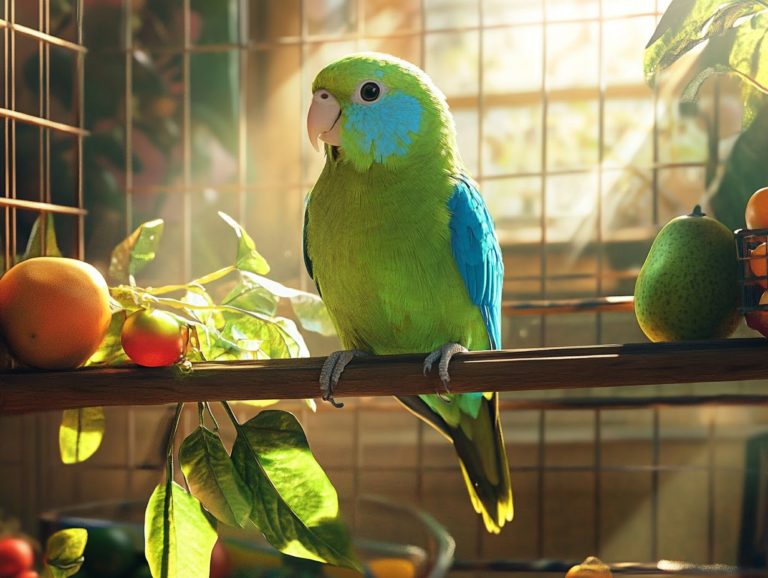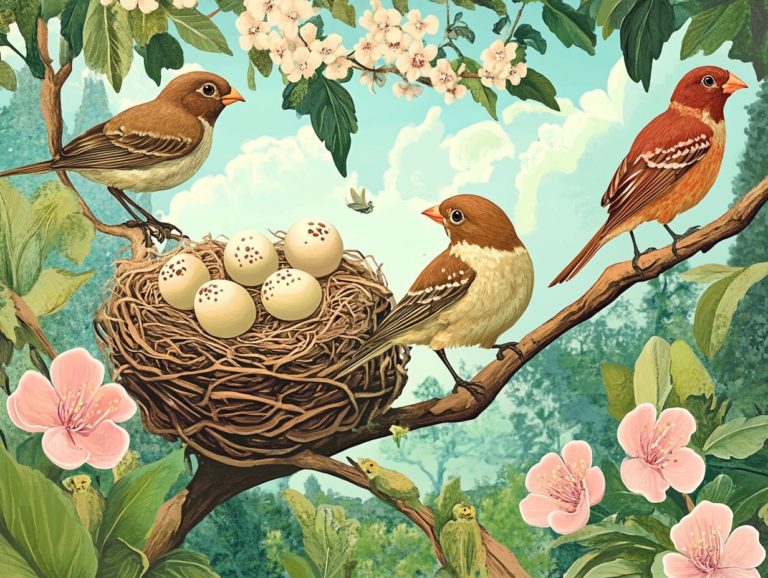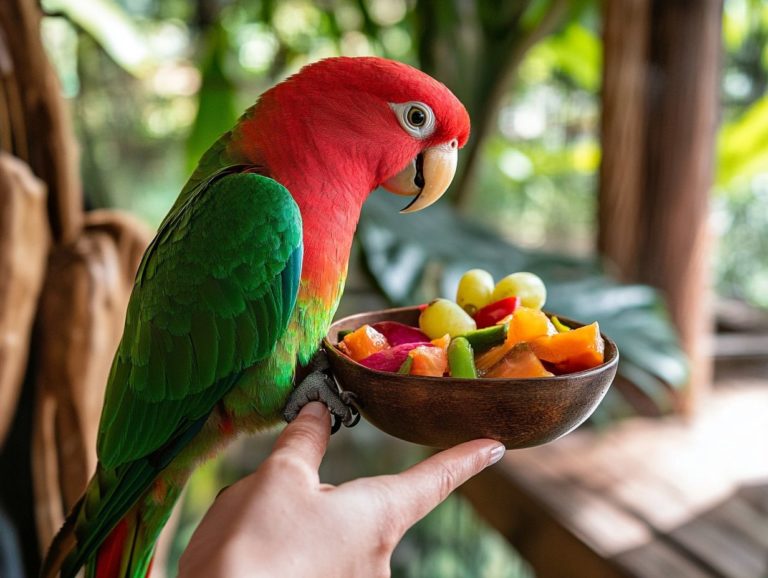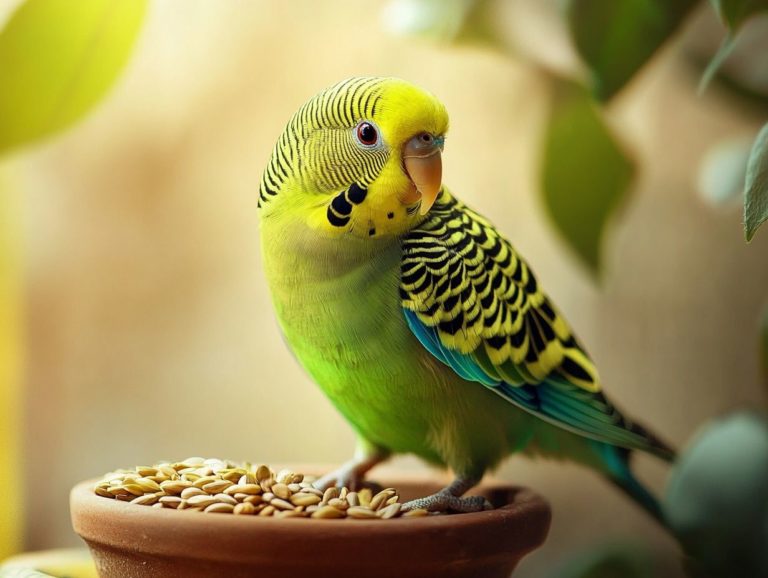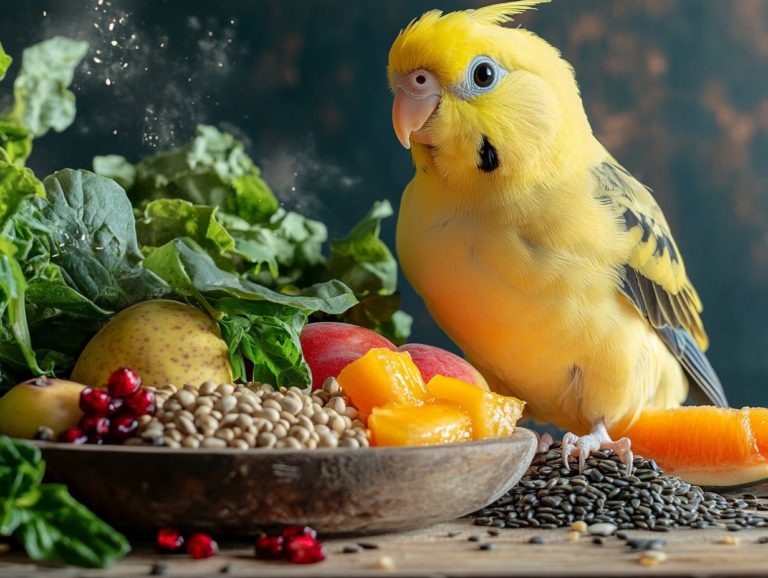Understanding Lovebird Nutrition: A Complete Guide
Your lovebirds deserve the best care, and proper nutrition is key to their happiness and health. Proper nutrition plays a vital role in the well-being of your affectionate birds, catering to their special requirements for various nutrients.
This guide delves into the essential nutrients they require, including proteins, carbohydrates, fats, vitamins, and minerals, along with fruits and vegetables. Get ready to discover the best feeding practices, recommended diets, and appropriate serving sizes to ensure your lovebird not only survives but thrives, supporting their activity levels and overall health.
You ll also learn when to incorporate supplements and how to spot signs of nutritional deficiencies crucial for recognizing potential health issues. There are also special dietary considerations to keep in mind for breeding and aging lovebirds, such as calcium supplementation for reproductive health.
Immerse yourself in this knowledge to provide your feathered friend with the exceptional care they truly deserve!
Contents
Key Takeaways:
- Proper nutrition is crucial for lovebirds, providing them with the necessary nutrients for energy, growth, and disease prevention.
- A balanced diet should consist of a variety of essential nutrients, including proteins, carbohydrates, fats, vitamins, and minerals, to meet their unique dietary needs.
- Supplements can be beneficial in certain situations, such as breeding or aging, but should only be used under the guidance of a veterinarian.
Why Proper Nutrition is Important for Lovebirds
Proper nutrition is essential for your lovebirds, as it directly influences their overall health, vitality, and longevity. These affectionate little creatures, celebrated for their vibrant hues and social behaviors, thrive on a well-balanced diet tailored to their specific needs, which you can learn more about in our guide on understanding the nutritional needs of parrots.
When essential nutrients are lacking, it can lead to serious health issues and even shorten their lifespan. Understanding the unique nutritional requirements of lovebirds such as the importance of a pelleted diet (a type of bird food that comes in small, compact pellets), along with fruits and vegetables is critical for their care.
By incorporating a variety of fresh foods, such as leafy greens and seeds, you not only enhance their diet but also stimulate their natural foraging instincts. Important nutrients like protein, calcium, and omega fatty acids are vital for promoting strong bones, maintaining feather health, and ensuring optimal energy levels.
Don t overlook the importance of regular visits to an avian veterinarian. These check-ups are crucial for monitoring your birds health and making timely dietary adjustments. They help detect any deficiencies early on and provide valuable guidance on the best dietary practices to enhance your lovebirds’ well-being, contributing to a longer, healthier life for your charming companions.
Essential Nutrients for Lovebirds
Essential nutrients for lovebirds include proteins, carbohydrates, fats, vitamins, and minerals, each playing a pivotal role in their health and well-being. As an owner, you understand that these intelligent birds thrive on a balanced diet, requiring a diverse array of food sources.
This diversity ensures they meet their nutritional needs and supports their lively, social behaviors. Careful attention to their diet is key to fostering their vitality and happiness.
Proteins, Carbohydrates, and Fats
Proteins, carbohydrates, and fats are the three essential nutrients that lovebirds rely on, providing the vital energy and building blocks necessary for their growth and maintenance. You need to ensure a balanced ratio of these nutrients to support their lively activity levels and overall health.
Proteins are crucial for muscle development and feather health, and you can source them from legumes, seeds, and high-quality pellets. Carbohydrates, which power their playful antics and flights, come primarily from fruits, grains, and certain vegetables. Meanwhile, healthy fats contribute to skin and feather vitality, often found in nuts and seeds.
By combining these nutrients, you not only boost their physical vigor but also promote mental stimulation, allowing lovebirds to thrive in a vibrant environment. A varied diet will help them receive all essential nutrients, supporting their playful spirit and keeping them engaged and happy.
Vitamins and Minerals
Vitamins and minerals are essential for lovebirds. They support vital functions like bone health, immune response, and feather maintenance.
Calcium is particularly crucial. It helps prevent deficiencies and promotes proper development.
Vitamin A is also vital for healthy skin and good eyesight. You can easily add vitamin A-rich foods like carrots, sweet potatoes, and leafy greens to their meals.
B vitamins, particularly B12 and folate, play a key role in energy production. These can be found in fortified seed mixes or specialized pellets designed for birds.
By providing a well-rounded diet that includes fresh fruits, vegetables, and specialized feeds, you can boost their health and happiness!
Feeding Your Lovebird
Feeding your lovebird requires a clear understanding of their dietary needs. A balanced mix of nutrients keeps their energy levels high.
Establish proper care routines by offering fresh food and water daily. This is essential for supporting their active lifestyle and vibrant personality.
Your commitment to their diet directly impacts their health and happiness.
Recommended Diet and Serving Sizes
A balanced diet for lovebirds includes pelleted diets, fresh fruits, and vegetables to ensure they get essential nutrients. Adjust serving sizes based on your lovebird’s activity levels and dietary needs.
Younger or active lovebirds may need larger portions of high-quality pellets. Older or less active birds should have reduced portions to prevent obesity.
For fresh fruits, offer about a teaspoon a day. Vegetables like kale or carrots can be served daily in quarter-cup portions.
Monitor their response and fine-tune their diets according to their age, health, and behavior to ensure they thrive.
Best Foods for Lovebirds
The best foods for lovebirds include a mix of fruits, vegetables, and a well-formulated pelleted diet. This ensures they receive all the essential vitamins and minerals.
Consider offering fresh fruits like apples, bananas, and berries, as well as vibrant vegetables such as carrots, spinach, and bell peppers. Prepare these by washing, peeling if needed, and chopping into small pieces for easy handling.
Avoid harmful foods like avocado and chocolate, as these can be toxic. Introduce new fruits or vegetables gradually to help your lovebirds adapt.
Supplements for Lovebirds
Supplements can significantly enhance your lovebird s well-being. They can fill dietary gaps or meet specific needs during breeding or aging.
Calcium supplements are often recommended to support strong bones and a robust reproductive system.
When and How to Use Supplements
Understanding when and how to incorporate supplements into your lovebirds’ diets is crucial for enhancing their overall health and addressing specific concerns. Consulting a bird doctor is a wise step to determine the right supplements tailored to your lovebird s health status and nutritional needs.
Look for signs that may indicate a need for supplements. Dull feathers, lethargy, or changes in droppings could suggest deficiencies or health issues. If your lovebird seems tired or its plumage lacks vibrancy, a vitamin A supplement might be what it needs to boost its immune system and promote healthier feathers.
Calcium supplements are especially valuable for breeding pairs or females that have recently laid eggs, as they are at risk for calcium deficiency. Each lovebird’s situation is unique, so customizing supplement choices is essential.
Signs of Nutritional Deficiencies
Recognizing signs of nutritional deficiencies in lovebirds is essential for preventing potential health issues and ensuring their overall well-being. Watch for symptoms such as changes in behavior, feather quality, and overall vitality.
If you notice any of these indicators, take action immediately by consulting a bird doctor to address your lovebird’s needs promptly.
Identifying and Addressing Deficiencies
Identifying and addressing nutritional deficiencies in lovebirds requires keen observation of their behavior and physical health. When you notice signs of illness, collaborate with a bird doctor to diagnose specific deficiencies and adjust their diet accordingly.
To assess their nutritional status, pay attention to changes in feather quality, activity levels, and appetite. Keeping a daily log can be invaluable, allowing you to note anything unusual for discussion with the vet.
Offering a variety of fresh fruits, vegetables, and high-quality pellets will enhance their diet and provide essential nutrients. You might also consider incorporating supplements, like vitamin A or calcium, which can offer additional benefits.
Regularly rotating food items can help prevent boredom and encourage a broader intake of vital vitamins and minerals. This approach will support a well-rounded and healthy diet tailored to restore their nutritional balance, including fruits and vegetables that are essential for their average lifespan.
Special Considerations for Lovebird Nutrition
Special considerations for lovebird nutrition are crucial during various life stages, such as breeding or aging. These phases may necessitate adjustments to their dietary needs and nutritional intake. Incorporating a proper pelleted diet can also be beneficial.
Understanding these unique requirements is essential for ensuring their health and longevity, especially considering their status as intelligent birds.
Dietary Needs for Breeding and Aging Lovebirds
Breeding and aging lovebirds have distinct dietary needs that you must meet to support their health and reproductive success. Make sure to keep a close eye on their nutritional intake during these critical life stages, ensuring they receive the energy and nutrients they require.
For breeding lovebirds, incorporate a variety of seeds, pellets, and fresh fruits and vegetables. These foods provide the vitamins and minerals crucial for egg development and overall vitality. High-protein options, like cooked eggs, can significantly enhance their reproductive health. Older lovebirds may thrive on softer foods and those enriched with extra vitamins to support their aging bodies.
Regularly monitoring their weight and behavior is vital for catching any health issues early on. Consulting a veterinarian will help you choose appropriate supplements, keeping both your breeding and aging lovebirds thriving.
Frequently Asked Questions
What is a lovebird?
A lovebird is a type of bird commonly kept as a pet. They are small and colorful parrots known for their affectionate and social nature.
For the best care, consider sharing your experiences with lovebirds in the comments below!
What should be included in a lovebird’s diet?
A complete diet for your lovebird includes fresh fruits, vegetables, nutritionally balanced bird food, and a small amount of seeds.
Offering a balanced diet helps your lovebird get essential nutrients for optimal health!
How much food should I give my lovebird?
The food amount varies based on your lovebird’s size, activity level, and age. Aim for about 2 tablespoons daily, mixing fruits, vegetables, and pellets.
Keep an eye on their weight and adjust their food as needed!
Can lovebirds eat human food?
Some human foods are safe, but research is crucial. Avoid avocado, chocolate, and caffeine at all costs!
Ask your veterinarian for a list of safe and beneficial human foods for your lovebird.
Do lovebirds need supplements?
A well-balanced diet usually covers all necessary nutrients. However, supplements might be needed for specific health concerns.
Consult your veterinarian before adding any supplements!
What are some signs of a healthy lovebird?
Look for bright and clear eyes, shiny feathers, and a healthy appetite. Your lovebird should be active and curious, showing lots of energy!
Regular vet check-ups ensure your feathered friend stays healthy and happy.

